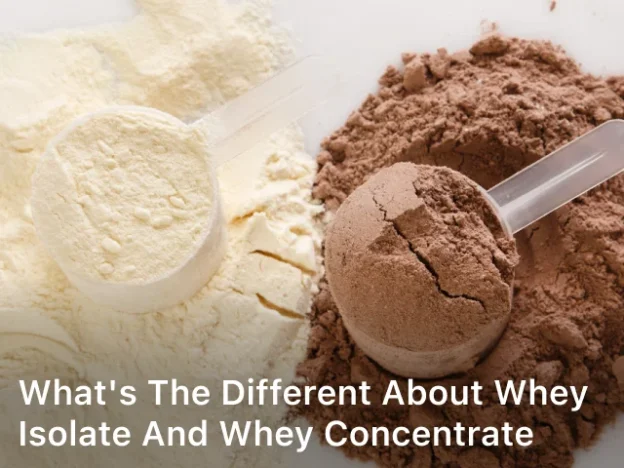nutrivitalhealth.com. What’s The Different about Whey Isolate and Whey Concentrate – Are you curious about “What’s The Different about Whey Isolate and Whey Concentrate?” This comprehensive guide breaks it down for you. Discover their variations, benefits, and which one is right for you. When it comes to protein supplements, whey protein is undoubtedly one of the most popular choices among fitness enthusiasts and athletes. However, the world of whey protein isn’t just limited to one type. There are two primary variants: Whey Isolate and Whey Concentrate. If you’re wondering, “What’s The Different about Whey Isolate and Whey Concentrate?” you’re in the right place. In this article, we’ll explore these two protein powders in detail, discussing their differences, benefits, and helping you make an informed decision about which one suits your needs best. What Is Whey Protein? Whey protein is a high-quality, complete protein derived from milk during the cheese-making process. It’s a byproduct of the curdled milk when milk solids separate from the liquid, leaving behind the liquid part, which is known as whey. This whey liquid is then processed to extract the valuable proteins, and through various filtration and purification methods, whey protein is produced in its powdered form. Whey protein is renowned for its exceptional amino acid profile, fast absorption rate, and numerous health and fitness benefits. Here’s a more detailed look at what whey protein is and its essential aspects: 1. Protein Composition: Whey protein is predominantly made up of essential amino acids, which are the building blocks of proteins in our bodies. It contains a complete profile of essential amino acids, making it an excellent source of protein for muscle growth, recovery, and overall health. 2. Types of Whey Protein: There are three primary types of whey protein: concentrate, isolate, and hydrolysate. Whey Concentrate contains a lower percentage of protein (about 70-80%) and retains some fats and lactose. It offers a balanced nutritional profile. Whey Isolate contains a higher protein content (usually over 90%) with minimal fats and lactose, making it an ideal choice for those who are lactose intolerant or looking for rapid protein absorption. Whey Hydrolysate is pre-digested, making it the easiest to digest, but it is less common and can be more expensive. 3. Fast Absorption: Whey protein is known for its rapid absorption, which means that the amino acids it provides quickly enter the bloodstream, making it an excellent choice for post-workout recovery or when your body needs a fast supply of protein. 4. Health Benefits: Regular consumption of whey protein is associated with numerous health benefits, including weight management, muscle building, and immune system support. Whey protein may help with weight loss by promoting a feeling of fullness and increasing metabolism. 5. Muscle Building and Recovery: For athletes and fitness enthusiasts, whey protein is a go-to choice for muscle building and recovery. Its high leucine content triggers muscle protein synthesis and helps repair and build muscle tissue after exercise. 6. Immune System Support: Whey protein contains immunoglobulins and lactoferrin, which can boost the immune system’s defenses, making it valuable for overall health. 7. Versatility: Whey protein can be easily incorporated into various diets and recipes. It’s commonly found in protein shakes, smoothies, and can also be used for baking and cooking to increase protein content in meals. 8. Considerations: While whey protein offers numerous benefits, it’s essential to choose the type that aligns with your specific dietary needs and fitness goals. Whey Isolate is lactose-free and provides a higher protein concentration, making it suitable for many individuals. Whey Concentrate, on the other hand, has a more balanced nutritional profile and may contain some lactose and fat. Whey protein is a high-quality, versatile protein source with a well-balanced amino acid profile. It’s valued for its fast absorption, making it a preferred choice for post-workout recovery and muscle building. With different types available, individuals can choose the one that best suits their dietary preferences and health and fitness objectives. Incorporating whey protein into your daily routine can be a convenient and effective way to ensure you meet your protein requirements and achieve your fitness goals. Keep Reading : Is Whey Protein Gluten Free and Safe to Use? What is Whey Concentrate Whey concentrate is a popular and versatile form of whey protein that holds a significant place in the world of nutrition and fitness. This type of whey protein, often found in various protein supplements, is derived from milk and is particularly valued for its balanced nutritional profile. Let’s explore Whey Concentrate in more detail: Protein Content: Whey concentrate typically contains around 70-80% protein by weight. While this protein concentration is slightly lower compared to its counterpart, Whey Isolate, it offers a distinct advantage of retaining a portion of the beneficial fats and lactose. This makes it an excellent choice for those who appreciate the nutritional benefits of these components and are not lactose intolerant. Digestibility: One of the remarkable characteristics of Whey Concentrate is its excellent digestibility. The presence of small amounts of lactose is usually well-tolerated by most individuals, even those with mild lactose sensitivity. This digestibility is a significant reason why Whey Concentrate is a go-to choice for a wide range of people. Gradual Absorption: Whey concentrate provides a slower and more sustained release of amino acids into the bloodstream compared to faster-absorbing options like Whey Isolate. This gradual absorption can be advantageous in certain situations. For instance, it can promote a longer-lasting feeling of fullness, making it a suitable choice for those aiming to control their appetite or maintain satiety throughout the day. Balanced Nutrition: While protein is the primary focus of whey concentrate, it also contains other essential nutrients that contribute to overall health. For example, it contains immunoglobulins and lactoferrin, which have been associated with immune system support. This makes Whey Concentrate a well-rounded protein source, offering more than just protein content. Taste and Texture: The small amounts of fats retained in Whey Concentrate can enhance the taste and texture of products that contain it. This





